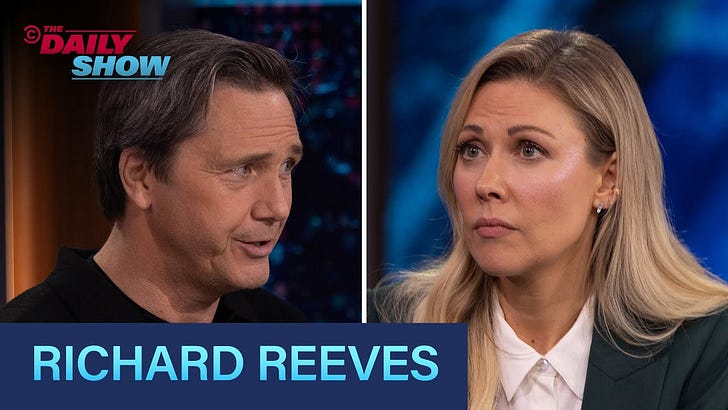Whether you love or hate the words “mansplain” and “toxic masculinity,” watch this clip:
It’s a conversation between Richard V. Reeves, ON BOYS podcast guest, author of Of Boys & Men, and president of the American Institute of Boys & Men, discussing boys’ & men’s issues with Desi Lydric on The Daily Show. With compassion and humor. Without minimizing the issues faced by women and girls.
I know that 15 minutes on a late night TV show won’t solve the problems of boys & men, but this conversation feels like a major step forward. What do you think?
Here’s to building boys!
Jennifer
P.S. I will be on vacation Jan. 14-24, so the next you’ll hear from me in Jan. 27.
IN THE NEWS
Highlights:
By 2010, in kindergarten classes, “there was more teacher-directed instruction, greater use of textbooks, workbooks, and worksheets, and ‘striking increases’ in the use of standardized tests…teachers spent substantially less time in 2010 [vs. 1998]on art, music, science, and child-selected activities.”
“For children, especially boys, the focus on early reading is almost certainly wrong.”
“Pushing the academic pressure downward doesn’t hurt every boy, but it does appear to set up many for failure.”
“Schools are expecting a cognitive and behavioral readiness for academic work that many boys are developmentally unprepared to meet…And once the sorting starts, they are caught in a feedback loop that often leads to chronic underachievement.”
“Earlier is not always better. It can often be harmful.”
Targeted Support Need to Bridge Education Gap for Boys in the Caribbean, Say Experts
Highlights:
“Merely providing access to education is insufficient for ensuring academic success… ‘In many classrooms across developing countries, one-third of our students are known to be physically present but disengaged from learning. They are in school but achieving no greater academic success than the child who is out of school’”
“Instead of solely focusing on academic performance, the system can pivot…The system should be creating entrepreneurs, not workers, so the mindset of the boys needs to be shifted.”
Boys Don’t Love to Read. Could This Former Teacher Be on to Something?
Highlights:
“I think boys get hooked on video games partly because the narrative is action, action, action. To get boys hooked on reading, I approach military history the same way.”
“Some public school teachers have privately said it’s challenging to add the books to their classrooms if they haven’t been first approved by an administration, school board, or some education bureaucracy. …Just as concerning is that many public school teachers are really angry about the part of the title that says ‘for boys.’ These teachers post hostile notes on Facebook and elsewhere.”
“From my experience teaching and from reading education studies, I know that boys who hate to read are much more likely to crack open a book if it seems ‘just for them.’ That’s the reason the title reads, “For Boys”: to entice boys, not to exclude girls.”
What Boys Sopranos Can Teach Us About Masculinity
Highlights:
“…while their historical raison d’etre has slowly evaporated, boy choirs now speak to the social needs of boys in a rapidly changing society that eschews toxic masculinity but has yet to offer boys many alternatives to replace it.”
“Many boys initially see singing as a feminine pursuit in a culture of compulsory masculinity…Boys-only choirs help maintain a tradition devoted to male singing, something that many boys say they are too embarrassed to do around same-age female peers.”
Should You Tell a Friend If Their Teenage Son is Messing Up?
Highlights:
“…we need to consider if we have a close relationship with fellow parents and can provide empathy and understanding, rather than being perceived as judgmental.”
“Is it necessary for safety for you to tell his parents? Do they need to know he’s making some really poor choices? Think about what you would need to know about your own son and use that to guide whether you tell your friend.”
“When you see another teenage boy doing something good, do you share that with his parents? Brag on your son’s friends and other teenage boys when you see them being helpful.”
Struggling to Stand: Young Men in Crisis
Highlights:
“Participation in the workforce for young adults in their early 20s is nearly two-thirds women.”
“What are the roots of this crisis? Experts say one reason is social isolation. Young men ages 18 to 30 spent nearly 20% more time alone in 2023 compared to 2019, which can cause issues for mental health and social development.”
“We’re So Back”: What Young Men Think About Trump’s Election
Highlights:
“Many young men feel they are either singled out as the problem, or told they should serve as allies to other groups more worthy of help. In a society that has become obsessed with identity, Trump gives permission for young men to be proud of theirs.”
“He's a character with a strong belief. And I think a strong belief is what a lot of young men need to get behind because they don't see that.” – Noah, a college student, talking about Trump
“I don’t think most young men endorse all of Trump’s erratic and offensive behavior. Why did so many of them vote for a bully? Maybe it’s because so many young men feel bullied, belittled, or disregarded in their own lives.”
ON BOYS Podcast




What a great clip. Thank you for sharing it, and the highlights from your posts as well. So much to chew on here. I feel like I’m really JUST starting to grasp how difficult/damaging it was for of my boys to go through childhood and adolescence with these limitations and biases, and they are 19-27. The lasting impact is real.
I put off watching this clip because I thought it really was a guy mansplaining --what a pleasant surprise.